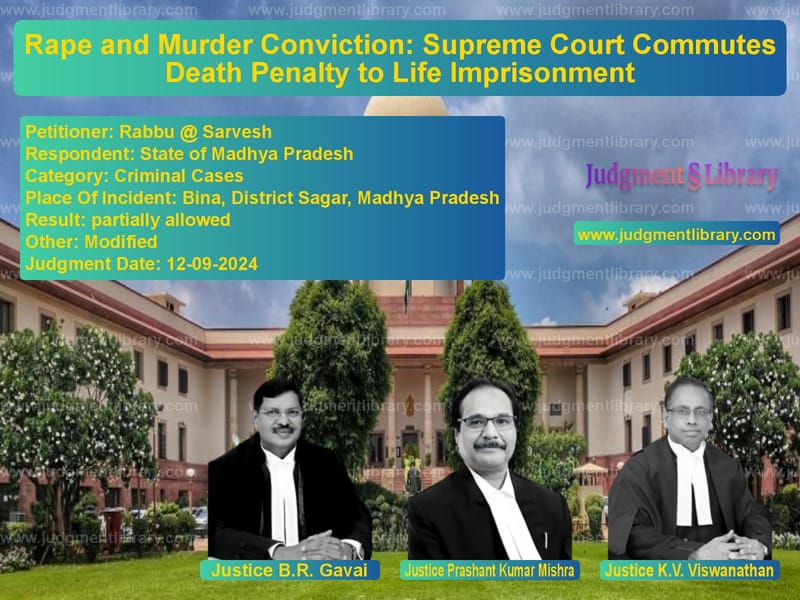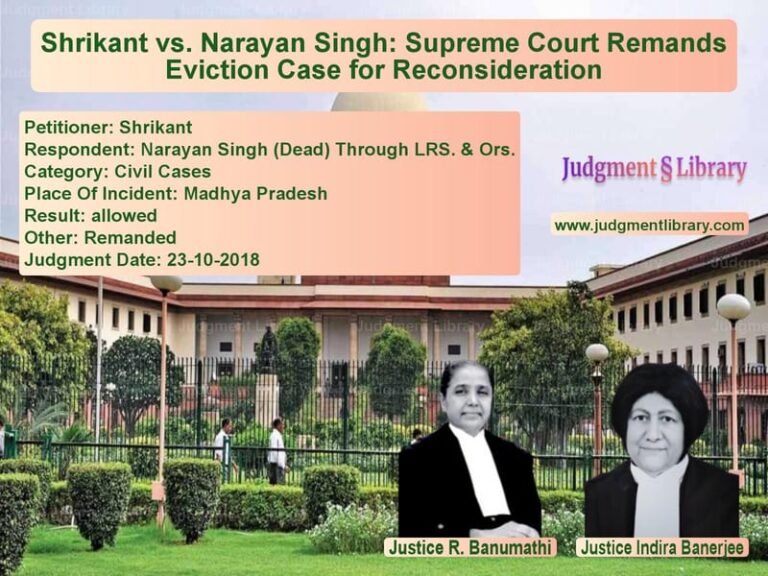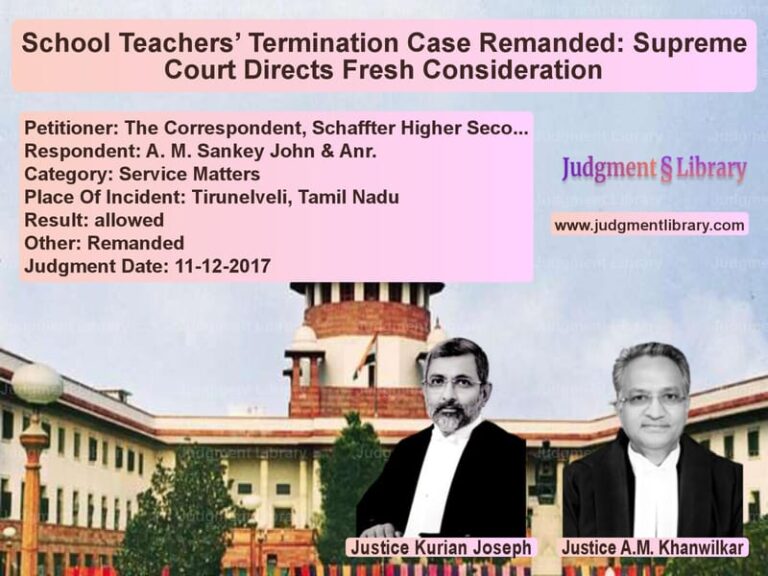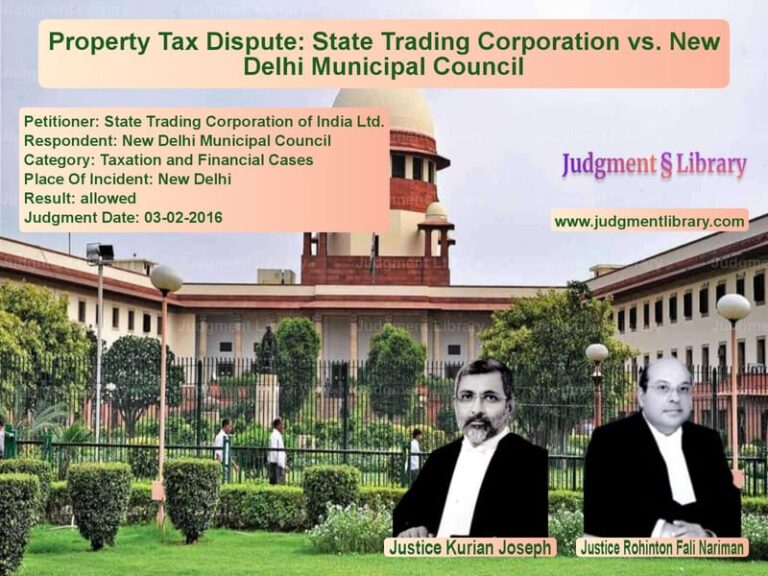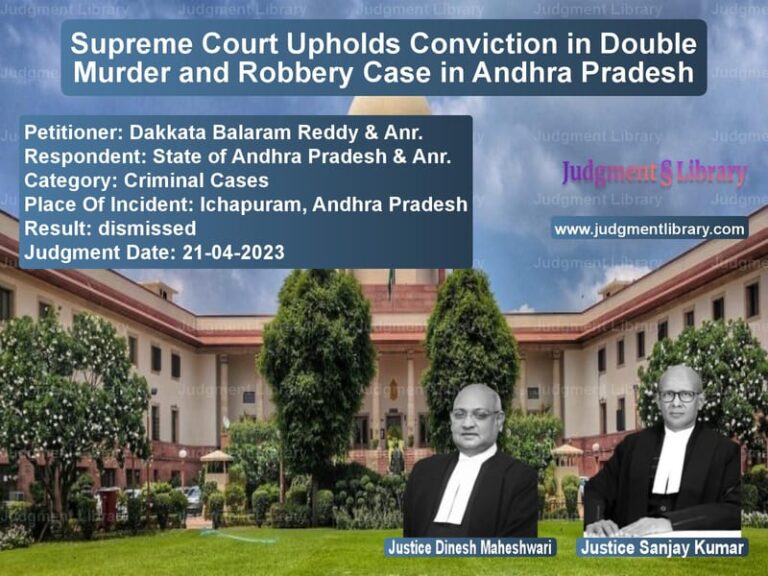Rape and Murder Conviction: Supreme Court Commutes Death Penalty to Life Imprisonment
The case of Rabbu @ Sarvesh vs. State of Madhya Pradesh revolved around a heinous crime involving rape and murder. The Supreme Court upheld the conviction of the accused but commuted the death penalty to life imprisonment without remission for 20 years, emphasizing the importance of considering mitigating factors before awarding capital punishment.
Background of the Case
The accused, Rabbu @ Sarvesh, was convicted for committing rape and murder of a minor under:
- Sections 450, 376(2)(i), 376D, 376A, and 302 read with Section 34 of the Indian Penal Code (IPC).
- Sections 5(g)/6 of the Protection of Children from Sexual Offenses Act (POCSO), 2012.
The First Additional Sessions Judge, Bina, District Sagar, sentenced the accused to death penalty under Sections 376A and 302 IPC and life imprisonment under Section 376D IPC, along with rigorous imprisonment of 10 years under Section 450 IPC. The Madhya Pradesh High Court upheld the conviction and the death penalty.
Arguments by the Appellant (Rabbu @ Sarvesh)
The defense, led by senior counsel Shri N. Hariharan, challenged the conviction and the sentence on multiple grounds:
- The case primarily relied on three dying declarations and a DNA report.
- The dying declarations were inconsistent and showed improvements over time, making them unreliable.
- The DNA report indicated the presence of a third person, casting doubt on the sole culpability of the accused.
- The death penalty was imposed without balancing mitigating and aggravating circumstances.
- The accused had a challenging socio-economic background, having lost his mother and brother at a young age.
- He exhibited good behavior in prison and engaged in constructive activities.
Arguments by the State of Madhya Pradesh
The prosecution, represented by Shri Bhupendra Pratap Singh, countered these claims:
- The trial court and the High Court had thoroughly examined the evidence and found the accused guilty beyond reasonable doubt.
- The victim’s dying declarations were consistent and corroborated by multiple witnesses.
- The accused showed no remorse, making him unfit for leniency.
- Given the brutality of the crime, it qualified as a ‘rarest of the rare’ case, justifying the death penalty.
Supreme Court’s Observations
1. Reliability of the Dying Declarations
The Court analyzed the victim’s three dying declarations and found the one recorded by the Executive Magistrate (PW-11) to be reliable. The declaration was endorsed by Dr. Avinash Saxena (PW-9), confirming the victim’s mental fitness. Additionally, oral statements from family members and a defense witness corroborated her allegations.
“The written dying declaration is corroborated by the oral dying declaration as has come on record in the evidence of her grand-father, grand-father’s brother, aunt, and uncle.”
2. DNA Evidence and Presence of a Third Person
The Court acknowledged the DNA findings but ruled that they did not exonerate the accused:
“The DNA report also points out towards the presence of a third person. However, this does not negate the involvement of the accused.”
3. Mitigating Factors and Death Penalty Review
The Court considered the mitigating factors before deciding on the death penalty:
- The accused came from a poor socio-economic background.
- He lost his mother at age 8 and brother at age 10.
- He had no prior criminal record.
- His prison conduct was satisfactory, engaging in religious and social activities.
4. Application of Judicial Precedents
The Court referred to past judgments where death penalties were commuted in similar circumstances:
- Swamy Shraddananda (2008) – Advocated a middle path between life imprisonment and the death penalty.
- Shankar Kisanrao Khade (2013) – Emphasized that capital punishment should be awarded only in extreme cases.
- Prakash Dhawal Khairnar (2002) – Considered socio-economic factors in sentencing.
Final Judgment
The Supreme Court upheld the conviction but commuted the death penalty:
“The order of conviction is maintained; however, the death penalty awarded under Sections 376A and 302 IPC is commuted to rigorous imprisonment for 20 years without remission.”
Impact of the Judgment
This ruling reinforces the principles of judicial review in death penalty cases. It establishes that:
- Capital punishment should be awarded only after exhaustive review of mitigating factors.
- Dying declarations must be carefully scrutinized for reliability.
- Judicial discretion must be exercised to ensure fairness in sentencing.
By opting for a middle-ground sentence, the Court balanced the severity of the crime with the possibility of reform, setting an important precedent for future cases.
Petitioner Name: Rabbu @ Sarvesh.Respondent Name: State of Madhya Pradesh.Judgment By: Justice B.R. Gavai, Justice Prashant Kumar Mishra, Justice K.V. Viswanathan.Place Of Incident: Bina, District Sagar, Madhya Pradesh.Judgment Date: 12-09-2024.
Don’t miss out on the full details! Download the complete judgment in PDF format below and gain valuable insights instantly!
Download Judgment: rabbu-@-sarvesh-vs-state-of-madhya-prad-supreme-court-of-india-judgment-dated-12-09-2024.pdf
Directly Download Judgment: Directly download this Judgment
See all petitions in Murder Cases
See all petitions in Rape Cases
See all petitions in Judgment by B R Gavai
See all petitions in Judgment by Prashant Kumar Mishra
See all petitions in Judgment by K.V. Viswanathan
See all petitions in partially allowed
See all petitions in Modified
See all petitions in supreme court of India judgments September 2024
See all petitions in 2024 judgments
See all posts in Criminal Cases Category
See all allowed petitions in Criminal Cases Category
See all Dismissed petitions in Criminal Cases Category
See all partially allowed petitions in Criminal Cases Category

